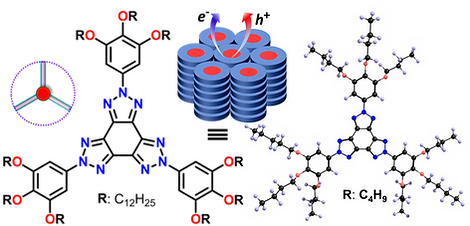
Research
Research Interests
Supramolecular Chemistry,
Organic Synthesis, Soft Matter, Liquid Crystals, Organic electronics (OLEDs and Semiconductors),
Biomimetics,Reflective tags, Complex photonic materials and systems
-
Designing discotic mesogens bearing novel cores.
The novel discotic explored is tris(triazole):
-
Designing discotic mesogens for electronic and optoelectronic applications:
For more than five decades, the mainstream electronics industry has been dominated by thin-film transistors based on inorganic semiconductors that require high temperature and high vacuum deposition techniques, which brings about high production costs. This challenge creates a need for new organic semiconducting materials (OSCs) with innovative design and semiconducting behavior that provide opportunities to reduce the cost of production, improve display quality, and avoid the use of toxic materials. The simple processing of OSCs with liquid crystalline phases can be viewed as a new generation of organic semiconductors. For all these applications, there is a need for room-temperature LC materials as these derivatives are potentially viable for processing. A brief highlight of the research work in this direction follows:
- We have developed perylene tetraester-based columnar discotic liquid crystals and fabricated them as emitters in solution-processable organic light-emitting diodes. Three derivatives 1a–c were prepared by varying the chain length, and all of them showed columnar hexagonal mesophase detected from wide-angle X-ray scattering studies. The OLED device was configured using two different hosts: m-MTDATA and CBP, with varying dopant concentrations. From electroluminescent data, compounds 1a–c showed a yellowish-green emission with CIE coordinates varying between (0.31, 0.39) and (0.43, 0.54). Out of the two hosts used, m-MTDATA proved to be a better host than CBP. Amongst all the dopant concentrations employed, device based on 1 wt% emitter 1c doped in the m-MTDATA host matrix displayed the best performance demonstrating PEmax of 17.2 lm W−1, CEmax of 18.5 cd A−1, and EQEmax of 6.3% with low driving voltage (2.5 V). The present work contributes to the usage of columnar discotic mesogens in organic devices that can result in high efficiencies and low turn-on voltage. However, their performance still needs improvement.
- C3-symmetric star-shaped discotic mesogen has been reported based on an electron-deficient tris(triazole) central rigid core functionalized with three peripheral trialkoxyphenyl units. The mesogen exhibits an enantiotropic columnar hexagonal (Colh) phase that can sustain over a significant temperature range. When used in space-charge limited current (SCLC) devices, it showed ambipolar charge transport behavior with high electron mobility (μe) of 1.61 × 10−2 cm2 V−1 s−1 at ambient temperature. The finding is sufficiently significant to warrant their use in organic electronic devices.
- The addition of thiophene, an electron-rich heterocycle, enhances the p-type nature of the overall system. In this context, a novel design of tetra-functionalized pinwheel-shaped pyrene-based DLCs 1a and 1b, where the pyrene central core is attached to four pro-mesogenic units via carbon-carbon triple bonds (Figure 2). The one-dimensional stacking of the molecules led the material to exhibit columnar phases and act as hole-transporting materials. The charge carrier mobility studies using the ToF method revealed room temperature hole mobility in the order of 10−4 cm2 V−1 s−1 for both mesogens. However, the mobility values for 1a were observed in the order of 10−3 cm2 V−1 s−1 at high temperatures because of the combined effect of viscosity and thermally activated polaron hopping. Such molecular systems showing temperature-dependent mobilities can potentially be used in nonlinear organic electronic applications.
-The engineering of a molecular structure has been presented that employs a tri-alkynyl benzene core incompatible with π-π stacking, providing flexibility to the system. Micro-segregation was prohibited due to the direct attachment of the flexible alkoxy chain to the central benzene ring, leading to a discotic nematic phase. The nematic phase was found stable down to room temperature and, on further cooling, transformed into a glassy state. The tri-alkynyl benzene moiety imparts high solid and solution-state blue emission properties to mesogens. On stimulating the compounds electrically as a solid-state emitter in OLEDs, they showed emission in the deep blue (CIEy < 0.08) region at 100 cd m-2 luminance and pure blue (CIEy < 0.11) region at maximum luminance using CBP host. The least viscous discotic mesophase is the nematic phase and can form large uniformly oriented domains, resulting in low turn-on voltage in this work. The present work gave rise to two pure deep blue emitters in OLEDs with a maximum EQE of 4.1% for the first time in the room temperature nematic LC phase with a CIE coordinate of (0.16, 0.07).
Since Oct 2024 Research Engineer
INPHYNI - Institut de Physique (Université Côte d'Azur - CNRS),
Supervisor: Prof. Michel Mitov
Topic: Replicating biological patterns for Designing materials with multifaceted properties: Implications for Multicolor Optical Tags
Aug 2020 - Feb 2025 PhD Project
Indian Institute of Science Education and Research, Mohali, India
Supervisor: Dr. Santanu Kumar Pal
Topic: Development of functional discotic liquid crystals for optoelectronic applications
May 2019 – August 2020 Master’s Project
Indian Institute of Science Education and Research, Mohali, India
Supervisor: Dr. Santanu Kumar Pal
Topic: Synthesis and Characterization of discotic liquid crystals
Feb.2018 – May 2018 Project
Panjab University, Chandigarh, India
Supervisor: Dr. S. K. Mehta
Topic: Synthesis of mesoporous silica material using silica extracted from renewable sources and different types of renewable surfactants.
May 2017 – July 2017 Summer Internship
Indian Institute of Science Education and Research, Mohali, India
Supervisor: Dr. Angshuman Roy Choudhury
Topic: Characterization of a series of fluorinated bisbenzylideneaniline
May 2016 – July 2016 Summer Internship
Indian Institute of Science Education and Research, Mohali, India
Supervisor: Dr. Angshuman Roy Choudhury
Topic: Synthesis of a series of fluorinated Bisbenzylideneanilines




